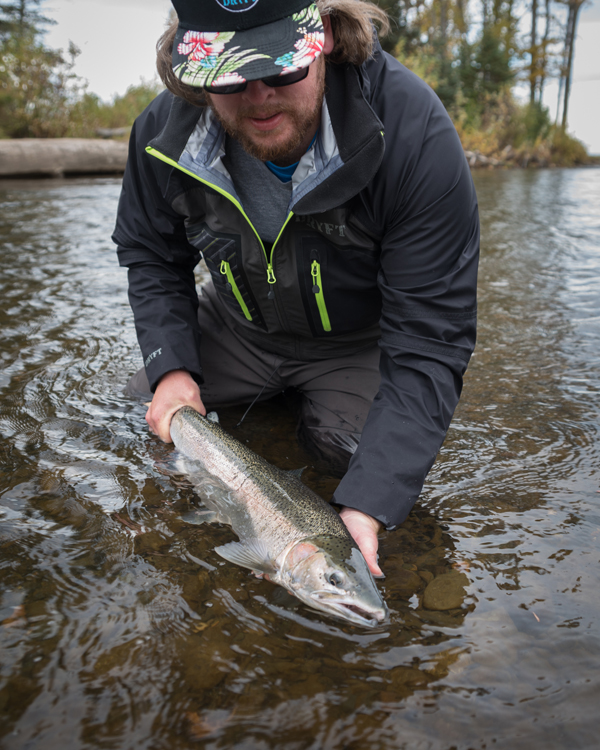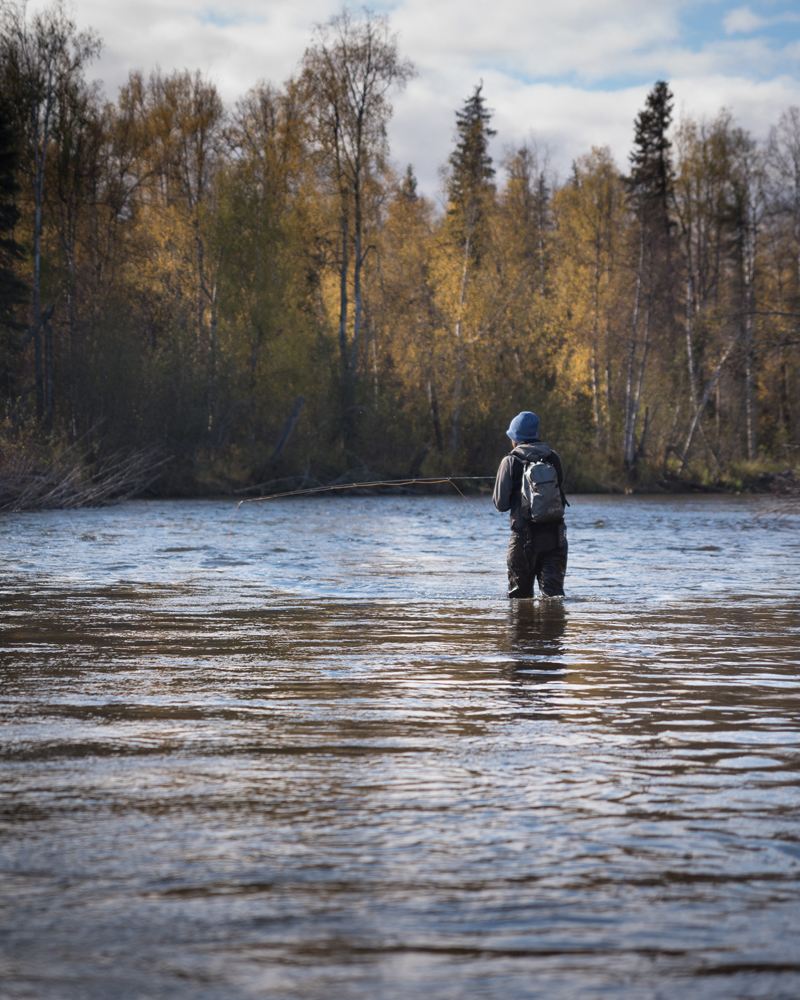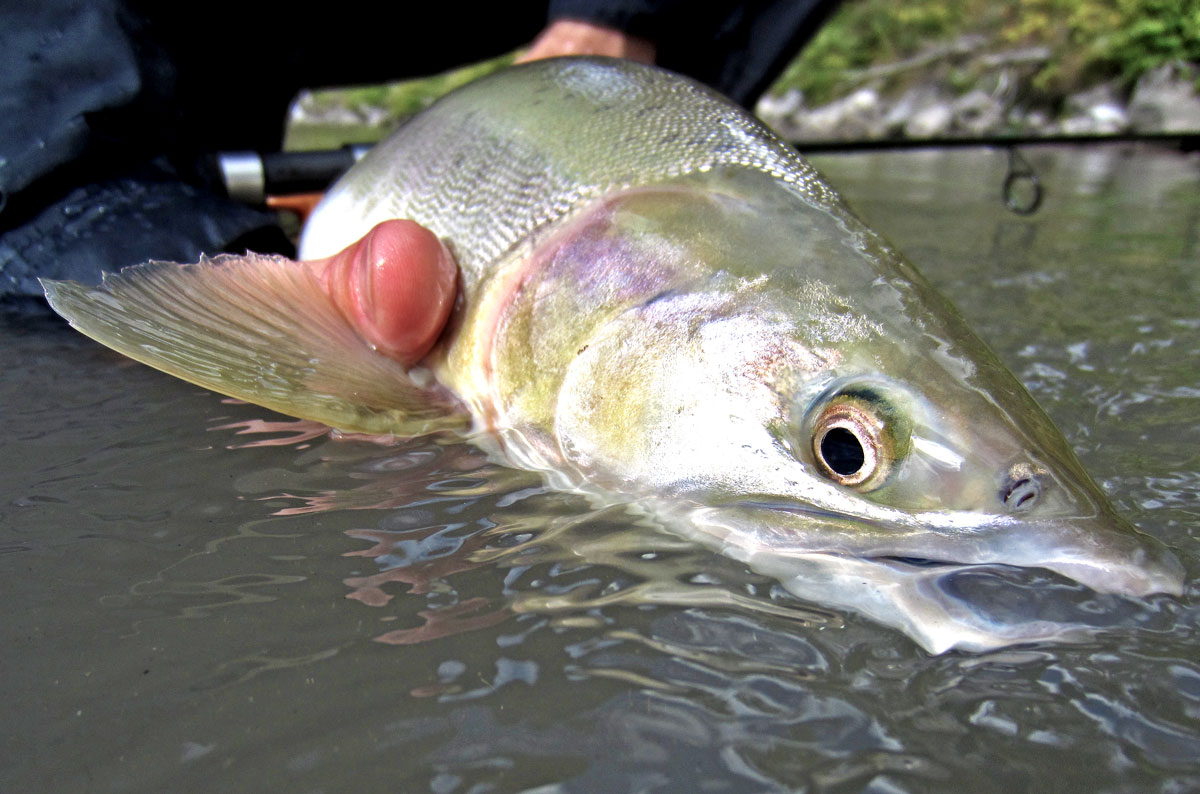Bridget Moran talking to us about some of the main features of the DRYFT women’s S14 Waders. #DRYFT #MadetoWade #waders
-
NEW
 S14 Wader – Women’s$429.00
S14 Wader – Women’s$429.00
Bridget Moran talking to us about some of the main features of the DRYFT women’s S14 Waders. #DRYFT #MadetoWade #waders

Based on the popular OG S14 waders the new mid-weight SEEKR waders convert from chest high to waist highs in a snap. The new SEEKR Convertible Waders are fully constructed of our mid-weight four-layer breathable and 100% waterproof DWR coated fabric in ‘denim’ print. Made for your next quick and light fishing mission.





From pocket zippers to waterproof zipper front wader models, all of our fishing waders have multiple zippers that provide different levels of function. The pocket zippers keep things organized and in place, while the main waterproof zipper on the Primo Zip front wader allows easy in and out access. All of the zippers need a little care from time to time to keep them running smoothly and operating for the long run. Here are four easy steps for how to care for your zippers.
Notes on storage and transport of zip front wader models. We recommend storing and transport your waders fully unzipped, with the exception of hanging zip front waders fully zipped up. Never bend or fold your waders when zipped up as this can add stress and create a weak point in the zipper. When packing for travel, fully unzip your waders and roll them from the feet up and try not to pack them at the bottom of your baggage with heavy items on top.
A final point about waterproof zipper front models. Foreign matter caught in the zipper can result in damage which may not be covered under warranty. Keep it clean and never force the zipper. If the zipper sticks at all when zipping, stop immediately and gently unzip in the opposite direction if possible, and then clean the zipper thoroughly before using again. We recommend Zipper Cleaner and Lubricant and Zipper Lubricant Stick from Gearaid to get it sliding smoothly again. Use the snap at the top to take stress off and keep it from pulling apart while wearing.


Before we dive into what condensation looks like and what can be done to manage it, a little background on why.
The material used on breathable waders works in this way; there are thousands of tiny holes, that are too small for moisture (water) to fit through but are big enough for vapor or air to move through. This allows air to flow through, hence making them breathable, but keeps water from passing through. Because the human body naturally passes moisture out through the skin, a bit of condensation build up throughout the legs, feet, knees and on the ankles is normal. This is just a function of moisture escaping the body and being left on the inside of the breathable membrane as the warm air escapes out through the fabric and leaves moisture behind.
Condensation dampness occurs when there is water moisture in the vapor, and as the air escapes through tiny holes in the membrane it leaves the moisture behind on the inside face of the fabric. This moisture then transfers or rubs onto the wearers inner layers. Condensation usually feels like dampness to the touch on the outside of the inner layer, that doesn’t soak all the way through to the skin. The dampness can be heavy at times, depending on the circumstances.
One thing to keep in mind is that you don’t have to be sweating or overly warm to experience condensation…the human body naturally expels moisture at all times.
You might be wondering how to tell the difference. First off, if you have multiple small damp spots on your pants that occur on both legs, but aren’t wet through to the skin then it is condensation. The spots can be small and limited to a single area, or they can be large and cover large parts of both legs, feet and torso. The first time you experience condensation it can be tricky to determine what the cause is. Just remember, if the layers you’re wearing under your waders are damp on the outside, but not wet through to the skin then it’s most likely condensation. If this has happened to you there are things that can be done to help manage it.

Epic condensation! The photo above is an example of poor layering choices (not wearing breathable layers), dressing too warmly for a cool morning which turned into a warm spring day combined with a long and brisk hike. This worked up quite a sweat and transferred moisture to the pants. In this extreme example of condensation the anglers long underwear under those sweatpants remained completely dry.
First thing is to switch your layers up. Try different combinations of pants, and socks. Sometimes just switching to a more breathable, fast drying, and moisture wicking layer can make all the difference in the world. If you’re wearing cotton pants, jeans, or cotton socks switch to wool or synthetics.
We often recommend wearing two layers of pants under your waders; first a thin base layer, such as a synthetic or wool long underwear, and then another synthetic fleece pant over that. The weight of these layers can be adjusted for the weather conditions; heavier in cold weather and lighter in warm weather. The reason for two layers is this: when you’re working up a sweat and expelling a lot of moisture, it can build up on the inside of the waders and then brush back onto the base layer of pants, getting the outer part of the base layer damp. With a single layer this can be a little uncomfortable. But with two layers it only transfers to the top layer and your inner base layer keeps you nice and warm.
When it’s warm out it’s not comfortable to wear multiple layers though, and we wouldn’t recommend doing so in warmer temps as it would just be too hot. When it’s warm out we usually wear light shorts and tall socks. The combo keeps your feet warm and covers most of your legs so you don’t have direct skin on wader material contact. A lightweight synthetic or cotton short is best. Normally cotton is not advised as a base layer, but it is highly breathable and cooling so when staying warm is not a concern cotton can be a decent base layer. This only applies when it’s warm out and you want to stay cool. If cotton gets wet it loses all insulating properties and will make you colder, so it’s never advised as a layer in cold weather.
Jeans are the worst layer you can wear under waders, for several reasons. Jeans aren’t very breathable, are restrictive and are also abrasive so can damage the seam tape on your waders long-term.
We often do two layers of socks as well. A thin liner and a thicker outer sock. This helps form a buffer that mops up any condensation and helps keep your feet from that cold clammy damp feeling.
We often hike long distances into our fishing spots. Often this requires walking several miles at a brisk pace, and includes scrambling/climbing over hills, logs, and obstacles. This can work up quite a sweat. We usually take an upper layer off and unzip our waders or roll them down if possible for the hike. Then once we’re fishing and settle back into a normal pace we layer back up and get after it.
In order for air to pass through the outer layer of fabric there can’t be a saturated layer of water on the outer layer, which is where the DWR coating comes into play. If the outer layer is saturated, it essentially voids the ability of the membrane to do its job, and the warm air won’t be able to escape. This will make the user warmer, sweatier, and more likely to get that damp clammy feeling.
The trick is to maintain the outer layer of fabric by keeping it clean and using a DWR reviver regularly so that water beads up and sheds off.
We recommend cleaning and reviving the DWR coating on your waders and jackets regularly, usually 1-2 times per year is adequate (of course depending on use). We recommend Revivex by Gearaid as it uses a simple spray on and let dry method. Start by cleaning your waders or jacket with a simple scrub down or with Pro Cleaner, and then spray with Revivex Durable Water Repellent.
We hope you find this information helpful. If you have any questions at all send us a message.


We’re expecting to have all sizes of jackets and waders on hand and shipping by the first week in June. This includes 3xl sizes!
If you’re interested in pre-ordering, just visit our site to place an order, which will ship just as soon as we have stock on hand. We expect all backorders to ship by June 7th. Check out the jackets and waders in the shop.
Huge thanks everyone for all of your interest in our gear, and for your patience as we work to get them back in stock!
[button link=”https://dryftfishing.com/shop/”]Shop now[/button]

Coming at you with a photo from this fall and a reminder to try some new water this fall and winter. Here we’re exploring a wadeable small creek in AK which gave up a few big ‘bows. #Madefortheriver





